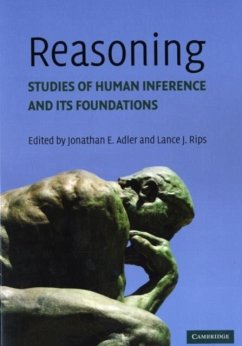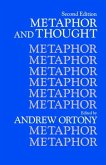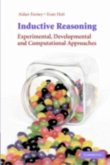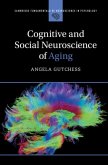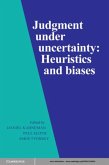Reasoning (eBook, PDF)
Studies of Human Inference and its Foundations
Redaktion: Adler, Jonathan E.


Alle Infos zum eBook verschenken

Reasoning (eBook, PDF)
Studies of Human Inference and its Foundations
Redaktion: Adler, Jonathan E.
- Format: PDF
- Merkliste
- Auf die Merkliste
- Bewerten Bewerten
- Teilen
- Produkt teilen
- Produkterinnerung
- Produkterinnerung

Hier können Sie sich einloggen

Bitte loggen Sie sich zunächst in Ihr Kundenkonto ein oder registrieren Sie sich bei bücher.de, um das eBook-Abo tolino select nutzen zu können.
This interdisciplinary work is a collection of major essays on reasoning: deductive, inductive, abductive, belief revision, defeasible (non-monotonic), cross cultural, conversational, and argumentative. They are each oriented toward contemporary empirical studies. The book focuses on foundational issues, including paradoxes, fallacies, and debates about the nature of rationality, the traditional modes of reasoning, as well as counterfactual and causal reasoning. It also includes chapters on the interface between reasoning and other forms of thought. In general, this last set of essays…mehr
- Geräte: PC
- mit Kopierschutz
- eBook Hilfe
- Größe: 7.05MB
- FamilySharing(5)
![Metaphor and Thought (eBook, PDF) Metaphor and Thought (eBook, PDF)]() Metaphor and Thought (eBook, PDF)66,95 €
Metaphor and Thought (eBook, PDF)66,95 €![Inductive Reasoning (eBook, PDF) Inductive Reasoning (eBook, PDF)]() Inductive Reasoning (eBook, PDF)28,95 €
Inductive Reasoning (eBook, PDF)28,95 €![Decisions about Decisions (eBook, PDF) Decisions about Decisions (eBook, PDF)]() Cass R. SunsteinDecisions about Decisions (eBook, PDF)29,95 €
Cass R. SunsteinDecisions about Decisions (eBook, PDF)29,95 €![Cognitive and Social Neuroscience of Aging (eBook, PDF) Cognitive and Social Neuroscience of Aging (eBook, PDF)]() Angela GutchessCognitive and Social Neuroscience of Aging (eBook, PDF)31,95 €
Angela GutchessCognitive and Social Neuroscience of Aging (eBook, PDF)31,95 €![Judgment under Uncertainty (eBook, PDF) Judgment under Uncertainty (eBook, PDF)]() Judgment under Uncertainty (eBook, PDF)44,95 €
Judgment under Uncertainty (eBook, PDF)44,95 €![Psychonarratology (eBook, PDF) Psychonarratology (eBook, PDF)]() Marisa BortolussiPsychonarratology (eBook, PDF)36,95 €
Marisa BortolussiPsychonarratology (eBook, PDF)36,95 €![Interpersonal Dynamics of Emotion (eBook, PDF) Interpersonal Dynamics of Emotion (eBook, PDF)]() Gerben A. Van KleefInterpersonal Dynamics of Emotion (eBook, PDF)26,95 €
Gerben A. Van KleefInterpersonal Dynamics of Emotion (eBook, PDF)26,95 €-
-
-
Dieser Download kann aus rechtlichen Gründen nur mit Rechnungsadresse in A, B, BG, CY, CZ, D, DK, EW, E, FIN, F, GR, HR, H, IRL, I, LT, L, LR, M, NL, PL, P, R, S, SLO, SK ausgeliefert werden.
- Produktdetails
- Verlag: Cambridge University Press
- Erscheinungstermin: 5. Mai 2008
- Englisch
- ISBN-13: 9780511451201
- Artikelnr.: 38195311
- Verlag: Cambridge University Press
- Erscheinungstermin: 5. Mai 2008
- Englisch
- ISBN-13: 9780511451201
- Artikelnr.: 38195311
- Herstellerkennzeichnung Die Herstellerinformationen sind derzeit nicht verfügbar.
Lance Rips received his Ph.D. from the Psychology Department at Stanford University in 1974 and taught at the University of Chicago from 1974 to 1993. Since 1993, Rips has been a professor of psychology at Northwestern University. He is on the editorial board of Cognition, Public Opinion Quarterly, and Informal Logic.
List of contributors
Introduction: philosophical foundations
Part I. Foundations of Reasoning: Section 1. Some Philosophical Viewpoints: 1. Change in view: principles of reasoning
2. Belief and the will
3. Internal and external reasons
4. Paradoxes
Section 2. Fallacies and Rationality: 5. When rationality fails
6. Extensional versus intuitive reasoning: the conjunction fallacy in probability judgment
7. Can human irrationality be experimentally demonstrated?
8. Breakdown of will
Part II. Modes of Reasoning: Section 3. Deductive Reasoning: 9. Logical approaches to human deductive reasoning
10. Mental modes and deductive reasoning
11. Interpretation, representation, and deductive reasoning
12. Reasoning with quantifiers
13. The problem of deduction
Section 4. Induction: 14. Patterns, rules, and inferences
15. Inductive logic and inductive reasoning
16. Reasoning in conceptual spaces
17. Category-based induction
18. When explanations compete: the role of explanatory coherence on judgments of likelihood
19. Properties of inductive reasoning
Section 5. Dual and Integrative Approaches: 20. Human reasoning and argumentation: the probabalistic approach
21. Individual differences in reasoning and the algorithmic/intentional level distinction in cognitive science
22. Reasoning, decision making, and rationality
Section 6. Abduction and Belief Change: 23. Defeasible reasoning
24. Explanatory coherence
25. Belief revision
26. Belief, doubt, and evidentialism
27. Reflections on conscious reflection: mechanisms of impairment by reasons analysis
28. Belief change as propositional update
Section 7. Causal and Counterfactual Reasoning: 29. Causal thinking
30. Causation
31. Propensities and counterfactuals: the loser that almost won
Section 8. Argumentation: 32. The layout of arguments
33. The skills of argument
34. Reasoning and conversation
Part III. Interactions of Reasoning in Human Thought: Section 9. Reasoning and Pragmatics: 35. Specificationism
36. Presupposition, attention, and why-questions
37. Further notes on logic and conversation
38. The social context of reasoning: conversational inference and rational judgment
Section 10. Domain-Specific, Goal-Based, and Evolutionary Approaches: 39. Domain-specific knowledge and conceptual change
40. Pragmatic reasoning schemas
41. Beyond intuition and instinct blindness: toward an evolutionarily rigorous cognitive science
42. Use or misuse of the selection task? Rejoinder to Fiddick, Cosmides, and Tooby
43. Why we are so good at catching cheaters
44. The modularity of mind: an essay on faculty psychology
45. Commitment Brian Skyrms
46. Evolution of inference
Section 11. Reasoning across Cultures: 47. Reasoning across cultures
48. Culture and systems of thought: holistic versus analytic cognition
49. On the very idea of a conceptual scheme
50. The truth in relativism
Section 12. Biology, Emotions, and Reasoning: 51. Logic and biology: emotional inference and emotions in reasoning
52. Distinct brain loci in deductive versus probabilistic reasoning
53. The emotional dog and its rational tail: a social intuitionist approach to moral judgment
Index.
List of contributors
Introduction: philosophical foundations
Part I. Foundations of Reasoning: Section 1. Some Philosophical Viewpoints: 1. Change in view: principles of reasoning
2. Belief and the will
3. Internal and external reasons
4. Paradoxes
Section 2. Fallacies and Rationality: 5. When rationality fails
6. Extensional versus intuitive reasoning: the conjunction fallacy in probability judgment
7. Can human irrationality be experimentally demonstrated?
8. Breakdown of will
Part II. Modes of Reasoning: Section 3. Deductive Reasoning: 9. Logical approaches to human deductive reasoning
10. Mental modes and deductive reasoning
11. Interpretation, representation, and deductive reasoning
12. Reasoning with quantifiers
13. The problem of deduction
Section 4. Induction: 14. Patterns, rules, and inferences
15. Inductive logic and inductive reasoning
16. Reasoning in conceptual spaces
17. Category-based induction
18. When explanations compete: the role of explanatory coherence on judgments of likelihood
19. Properties of inductive reasoning
Section 5. Dual and Integrative Approaches: 20. Human reasoning and argumentation: the probabalistic approach
21. Individual differences in reasoning and the algorithmic/intentional level distinction in cognitive science
22. Reasoning, decision making, and rationality
Section 6. Abduction and Belief Change: 23. Defeasible reasoning
24. Explanatory coherence
25. Belief revision
26. Belief, doubt, and evidentialism
27. Reflections on conscious reflection: mechanisms of impairment by reasons analysis
28. Belief change as propositional update
Section 7. Causal and Counterfactual Reasoning: 29. Causal thinking
30. Causation
31. Propensities and counterfactuals: the loser that almost won
Section 8. Argumentation: 32. The layout of arguments
33. The skills of argument
34. Reasoning and conversation
Part III. Interactions of Reasoning in Human Thought: Section 9. Reasoning and Pragmatics: 35. Specificationism
36. Presupposition, attention, and why-questions
37. Further notes on logic and conversation
38. The social context of reasoning: conversational inference and rational judgment
Section 10. Domain-Specific, Goal-Based, and Evolutionary Approaches: 39. Domain-specific knowledge and conceptual change
40. Pragmatic reasoning schemas
41. Beyond intuition and instinct blindness: toward an evolutionarily rigorous cognitive science
42. Use or misuse of the selection task? Rejoinder to Fiddick, Cosmides, and Tooby
43. Why we are so good at catching cheaters
44. The modularity of mind: an essay on faculty psychology
45. Commitment Brian Skyrms
46. Evolution of inference
Section 11. Reasoning across Cultures: 47. Reasoning across cultures
48. Culture and systems of thought: holistic versus analytic cognition
49. On the very idea of a conceptual scheme
50. The truth in relativism
Section 12. Biology, Emotions, and Reasoning: 51. Logic and biology: emotional inference and emotions in reasoning
52. Distinct brain loci in deductive versus probabilistic reasoning
53. The emotional dog and its rational tail: a social intuitionist approach to moral judgment
Index.
